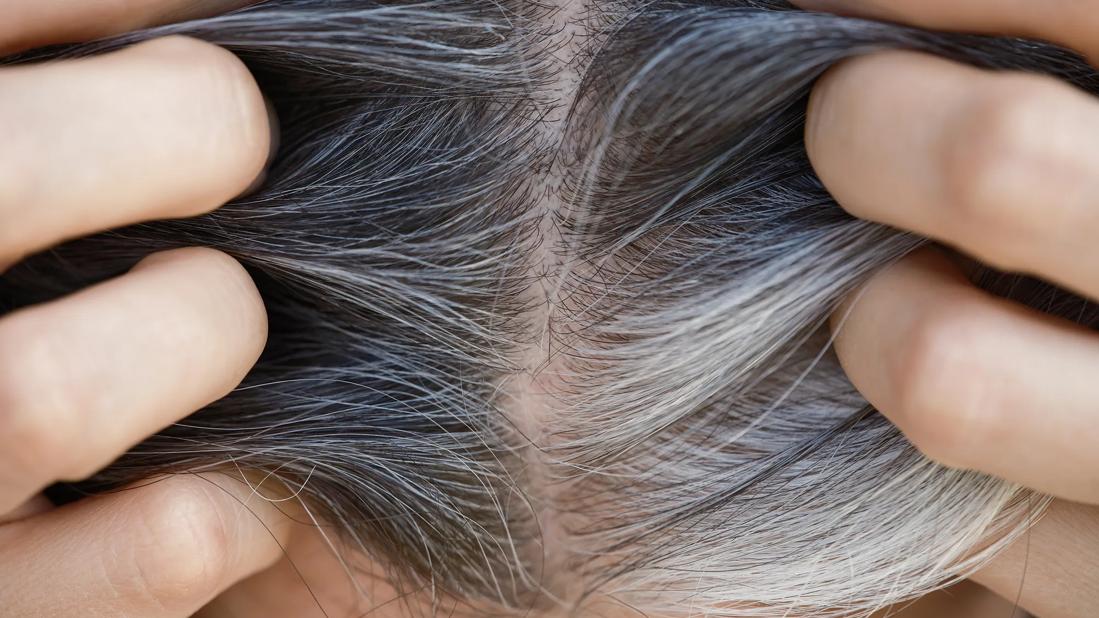Age is the most likely reason for typical graying, but premature graying may be caused by stress, diet, smoking or autoimmune disease

Image content: This image is available to view online.
View image online (https://assets.clevelandclinic.org/transform/c691828a-eece-45f8-808f-7c5bb6f95772/grey-hair-roots-1404681801)
Hands parting hair at top of head, showing gray hairs growing in
A silver strand catches your eye as you look in the mirror. You immediately lean in for a closer inspection. Your fingers tousle your hair in a frantic search. Could there really be a gray hair on your head?
Advertisement
Cleveland Clinic is a non-profit academic medical center. Advertising on our site helps support our mission. We do not endorse non-Cleveland Clinic products or services. Policy
The answer is yes because going gray is a natural part of human development (even if many people dread it, given societal feelings about aging).
But why does hair turn gray and — maybe more importantly to some folks — can this transformation be delayed or even prevented? Let’s find out from dermatologist Wilma Bergfeld, MD.
A natural pigment called melanin dictates the color of your hair. Different blends can tint your hair hues of black, brown, blonde or red. “The amount and combination of melanin determines hair color,” explains Dr. Bergfeld. “It’s like paint-mixing.”
But as you age, cells in your hair follicles called melanocytes produce less melanin. It could happen because the color-producing cells wear out, get damaged or lose support systems in the body.
Whatever the reason, the reduction in melanin fades your hair to shades of gray. White hair is a sign of very little or no melanin production.
Research shows that most people start seeing gray hairs on their head in their 30s or 40s, though timing often varies from person to person. People who are white typically go gray earlier than people who are Hispanic, Asian or Black.
Aging isn’t the only thing that may turn hair gray, says Dr. Bergfeld. Younger folks may see silver streaks in their hair for the following reasons:
Advertisement
If your hair turns gray, it’s unlikely you’ll see it regain color naturally.
Once cells stop making melanin, they typically don’t ramp production back up. That’s particularly true when it comes to age-related color changes. There’s simply no turning back the clock. (Sorry.)
Lifestyle changes may help you slow the graying process if it’s related to controllable issues like stress, nutritional deficiencies or cigarettes. Resolve those and you may find that you keep more of your natural color.
But even in those situations, don’t expect gray hair to go back to its previous hue, says Dr. Bergfeld.
It should be noted, though, that the natural look of gray hair is trending these days! But if that’s not what you want to see in the mirror, hair dye offers a rainbow of options to tint every hair on your head.
Advertisement

Sign up for our Health Essentials emails for expert guidance on nutrition, fitness, sleep, skin care and more.
Learn more about our editorial process.
Advertisement
Rosemary oil’s antioxidant, anti-inflammatory and antimicrobial properties could help stimulate hair growth
Scalp cancers can occur because of long-term sun exposure
Soften your skin with warm water and shaving cream before shaving with the grain of the hair
Focus on nutrition, gentle styling habits and adapting to your hair type
How often you lather up your locks can depend on various factors, like hair type, age and ethnicity
Eating whole grains, salmon, fruits and vegetables can help you achieve longer, healthier locks
Your genes, ethnicity, diet and stress levels may all affect your facial hair
Your hair removal routine will depend on your pain tolerance, budget and skin sensitivities
Prioritize your health by managing stress, strengthening your social connections and getting quality sleep
Bolsters, blankets, pillows and blocks can offer extra support, stability and comfort
Allergies, postnasal drip, asthma or reflux could be to blame for a cough that won’t quit